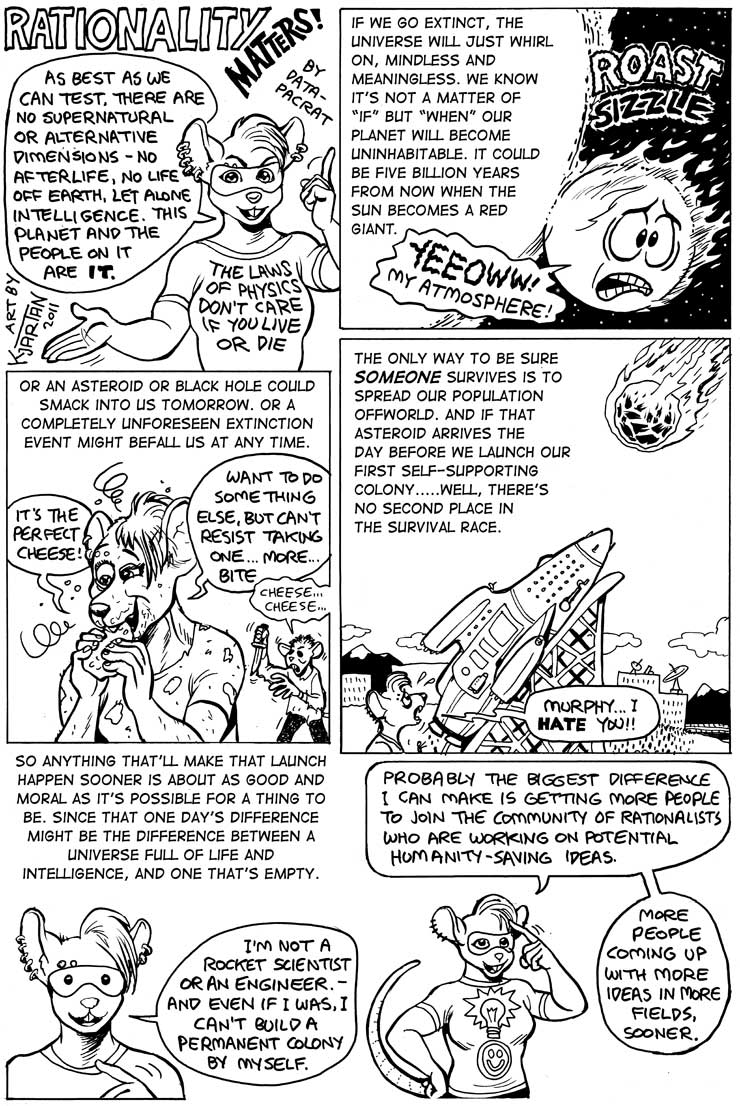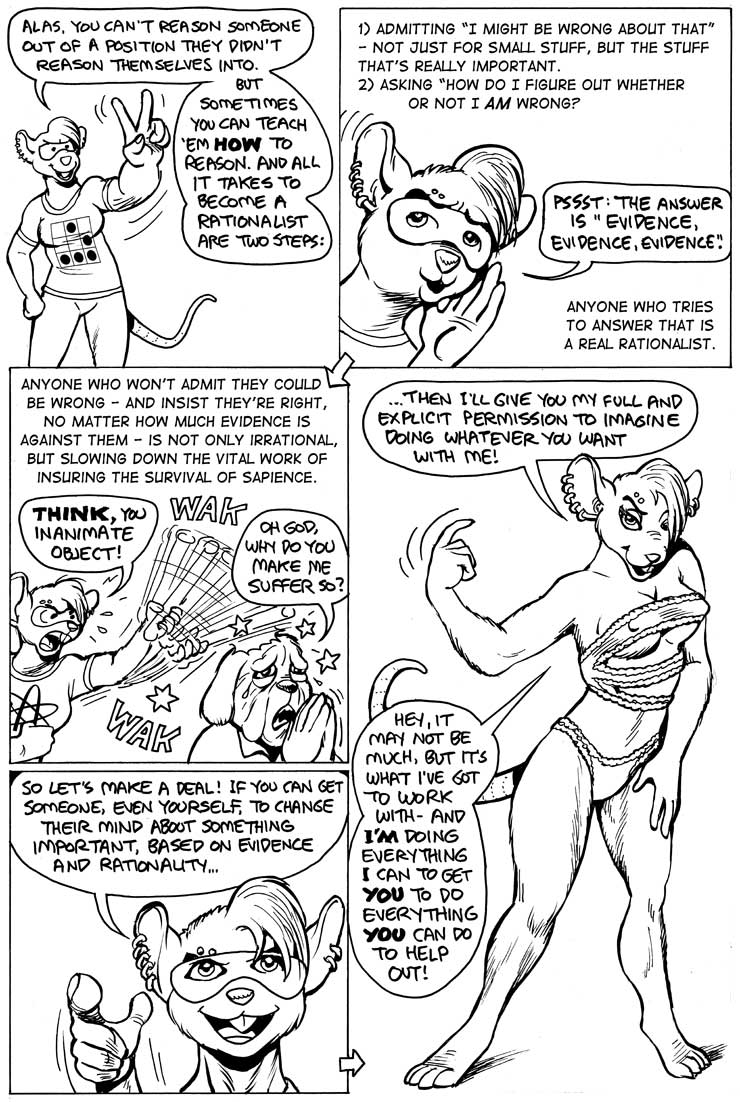From an email I sent today:
I’ve found a few meta-rules to be handy in working out the
rules-of-thumb. Aiming for the overall goal of avoiding the extinction
of sapience in the universe could be considered one; another is that
it’s generally infeasible for there to be one rule that applies to
myself and another rule that applies to everyone else; and yet another
is that if there’s a way for one person to end up worse than the other
as the result of an interaction, it’s safe to assume that I’m more
likely than not to end up on the worse side of things (ie, my ‘not as
smart as I like to think’ quote), so it’s worthwhile to try ensuring
that the worse that can happen is the best possible. (This latter
meta-rule has, in the present-day, tended to nudge me in the direction
of favouring labour over mercantalist oligarchs, though I haven’t
signed up with the IWW quite yet.)
…
As of a couple of years ago, one of the meta-rules I relied on most
heavily was “I’m a selfish bastard, but I’m a /smart/ selfish bastard
interested in my /long-term/ self-interest.” (This meta-rule has since
become, at best, secondary to preventing sapience’s extinction, if for
no other reason than if all sapience dies out, I would, too.) This
resulted in what I called the “Trader’s Definition” for personhood,
and for granting whatever rights are inherent in personhood: if some
entity can choose whether or not to exchange a banana for a backrub,
or some programming for some playtime, then it’s in my own
self-interest to have everyone treat that entity /as if/ it were a
person. Whether or not it meets any particular philosophical
definitions of self-awareness, the mechanisms that underlie the
efficiencies of a competitive marketplace don’t seem to care much
whether any particular economic agent has any particular level of
consciousness. This idea also meets some of the other meta-rules, as
it’s a rule that applies as equally to me as to anyone else; and even
if some enhanced transhuman thinks only transhumans should have
rights, the principle of comparative advantage means that even if such
a transhuman is better than me at everything, I can still contribute
to the overall economy through the principle of comparative advantage,
and thus still should receive enough rights to allow me to be a
participant in such economy.
This definition also allows reasonably simple extensions to decide
about children and adults with disabilities. The former still have the
potential to become economically-functioning adults, so it’s
worthwhile to ensure they have enough rights to maximize the chances
that they will do so. (Even fetuses can be considered under this
criteria, though the mother’s rights also have to be considered, and
can easily outweigh the rights of the fetus.) The latter is a
situation where any individual has a chance of ending up, so in order
to ensure your own future is as comfortable as possible, it’s
reasonable to grant such people enough rights to allow a life with as
much dignity as possible. In general, animals are unable to make
choices, and humans generally don’t turn into them, so there’s no real
impetus to give them any rights. (However, as humans do have mirror
neurons that allow them to subjectively feel what they think other
beings are feeling, including animals, there does exist an impetus to
reduce animal suffering in order to reduce human suffering, but that’s
not quite the same thing, and there are plenty of other forms of human
suffering which are a higher priority.)
With a bit of squinting, a number of potential technologies can be
viewed through this lens, as well. A classic SF trope is to turn
ordinary animals into uplifted animals to act as a new servant class;
if it really does become possible to upgrade a dog into something
which can do a human-level job, such a creature would almost by
definition be able to do all manner of human-level tasks, which makes
it worthwhile to let them figure out which job gives them the best
comparative advantage, freeing humans to work at whatever gives /them/
the best comparative advantage, ending up with everyone’s lives being
better all around.
I’ve recently read a book which has given me a further perspective on
all of the above: “The Dictator’s Handbook: Why Bad Behavior is Almost
Always Good Politics”, by Bruce Bueno de Mesquita and Alastair Smith.
Their thesis is that all political organizations can be sorted by how
many people the leaders depend on to stay in power; and one of their
conclusions is that once such leaders require the support of a
significant part of the population, their goals shift from satisfying
their inner circle by essentially bribing them to satisfying the
larger public by implementing public policy that benefits their outer
circle. A further conclusion is that even in a nominally democratic
system, the particular details of the election process may mean that
the [potential] leaders only have to pay attention to a surprisingly
small part of the overall electorate; and thus, in order to induce the
[potential] leaders to create policies that benefit as much of the
public as possible, it’s worthwhile to try to work on certain forms of
electoral reform. Lessig’s “Rootstrikers” project seems to be one of
the best available groups working on this idea.
To put this in more concrete terms, and relate it to the above
discussion on rights: If a first-past-the-post electoral system is in
place, and certain districts are almost certain to vote one way or
another, then the campaigning politicians have very little incentive
to offer those districts any benefits, compared to the benefits they
offer to swing districts. And even within those swing districts, there
are various blocs to court, some of which may already be committed to
one party or another. The incentives faced by the leaders are to focus
only on improving the lives of those groups who might make a
significant difference to their re-election campaign. There’s no
particular incentive to those leaders to give any rights at all to,
say, uplifted dogs, unless doing so gives them a competitive
advantage; either by improving the lives of the swing voters they’re
focusing on, or if it seems likely that giving said uplifts the right
to vote will give their own campaign more votes than the opponent. The
main benefit gained by giving rights to uplifts is the overall
improvement of the economy, which is an extremely broad-based and
generalized improvement, and doesn’t do very much to improve the lives
of, say, the porn-farmers’ lobby; and so the way which seems to
maximize the odds of ensuring that uplifts receive such rights is to
maximize the number of people any particular politician has to court
in order to win an election, such as by working on cutting down on
gerrymandering.

